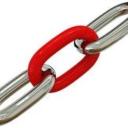Yahoo Answers is shutting down on May 4th, 2021 (Eastern Time) and beginning April 20th, 2021 (Eastern Time) the Yahoo Answers website will be in read-only mode. There will be no changes to other Yahoo properties or services, or your Yahoo account. You can find more information about the Yahoo Answers shutdown and how to download your data on this help page.
Trending News
Fully expand the logarithm ?

2 Answers
- la consoleLv 75 days ago
= Log[5](3x²/14) → you know that: Log(a/b) = Log(a) - Log(b)
= Log[5](3x²) - Log[5](14)
= Log[5](3 * x²) - Log[5](7 * 2) → you know that: Log(a * b) = Log(a) + Log(b)
= Log[5](3) + Log[5](x²) - { Log[5](7) + Log[5](2) }
= Log[5](3) + Log[5](x²) - Log[5](7) - Log[5](2) → you know that: Log[x^(a)] = a.Log(x)
= Log[5](3) + 2.Log[5](x) - Log[5](7) - Log[5](2)
- llafferLv 75 days ago
log₅(3x² / 14)
First, let's get the prime factorization of the 14:
log₅[3x² / (7 * 2)]
Now, I'll turn the log of a product and quotient into the sum and differences of logs:
log₅(3) + log₅(x²) - log₅(7) - log₅(2)
Then the second term can have the exponent pulled out of the log:
log₅(3) + 2 log₅(x) - log₅(7) - log₅(2)
This is answer D.


